The impact of the refugee crisis on the world economy
Refugee Resettlement and How to Participate in Refugee Care Ministries
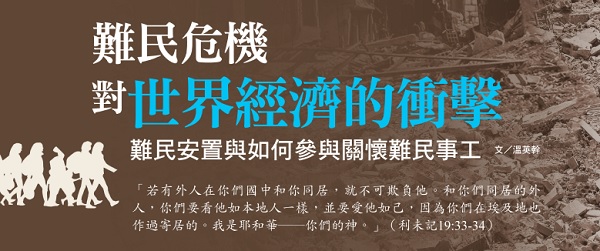
I. Introduction
The author wrote the article "The Impact of the Refugee Crisis on World Politics and Society" for the 56th issue of Kingdom of God magazine (Summer 2019), briefly describing the refugee crisis that has occurred in Europe and other regions since 2015, the historical evolution of refugee affairs, and the development of refugees. Definition and demographics, and the impact of the refugee crisis on the politics and society of various countries. The reason for targeting Europe is that the refugee issue in Europe is a topic of concern to major international media. This article will focus on the impact of refugee resettlement on the economies of various countries, and how Christians can participate in and assist in refugee ministry.
2. Solutions to the refugee problem
Many countries suffer from various problems caused by the influx of refugees. If international organizations or human rights groups only wave the banner of humanitarianism to persuade countries to accept refugees, it will be difficult to convince the host countries. Especially if the host country is a developing country with a relatively backward economy, poor people and financial difficulties, it will be difficult for the country to have enough resources to receive refugees. The wealthier groups in these countries are not willing to use their hard-earned money to pay taxes to support the asylum guests. 11
解決難民問題,釜底抽薪的方法是減少難民。難民中,68%來自五個戰亂頻仍的國家。2 例如流亡到歐洲的難民是受中東戰亂之苦的人民,所以只要中東國家減少戰亂衝突,就可減少一大批難民。而歷史顯明,人類多數戰爭起於掌權者或奪權者假借正義或主權之名而行暴力之實,受苦的是老百姓,特別是處於社會基層的貧民或弱勢團體。
中美洲往美國邊境非法移民,是因自己國家政治不穩定及暴亂,加上經濟落後,為了改善生活水準,而不惜冒生命危險,攜家帶眷地跋涉數千里到美墨邊境(據報導,其中包括為數57,000沒有成人陪伴的未成年者)。3 墨西哥深受過境移民的困擾,也成了受害者,甚至遭受美國政府指責墨西哥政府對防堵移民過境出力不夠,而以提高關稅作為威脅。為了提供人道救援,墨西哥面臨兩面不討好的困境。中南美國家如能加強政治穩定及增進經濟發展,改善全民生活環境,必能減少移民或逃離的意願。
Some of the refugees who fled to neighboring countries originated from political violence, such as the political strife in Venezuela; the Myanmar military's genocide tactics caused the Rohingya ethnic group to flee to Bangladesh; South Sudanese refugees were also created due to civil war. If the violence subsides and politics becomes stable, the refugees will gradually return home. The root cause of Africa's refugee problem lies in political instability, backward economic development and uneven income distribution. In addition, there is interference from terrorist organizations, which affects political and economic stability.
The solutions to the above problems are easy to say, but extremely difficult to implement, and involve too many factors beyond our control. The goal of international institutions such as the World Bank or the United Nations Development Program in the past half century has been to reduce poverty. Although significant progress has been made, many countries are still under-developed poor countries.
The World Bank estimates that based on the extreme poverty line (income less than US$1.9 per person per day), the number of extremely poor people in the world dropped from 11% in 2013 to 10% in 2015, with a total of approximately 73,590 people (as of press time) latest information). Compared with 1990, when the proportion of extremely poor people was as high as 36%, although there has been much improvement, the total number is still very high. The sharp decline in rates reflects significant progress in poverty reduction in several regions.
Statistics in 2015 show that East Asia and the Pacific (with the largest decrease in China) and Europe and Central Asia reduced the number of extremely poor people to 2.6% (47.2 million people) of the regional population.
Most of the world's extremely poor people are concentrated in sub-Saharan Africa. In recent years, the number of poor people has increased instead of decreasing (accounting for 41.1% of the regional population, reaching 413 million). Secondly, most of the poor live in rural areas, and most of them live in rural areas. Young people under 18 again. 44
The extremely poor people in South Asia account for 12.4% of the regional population, 216.4 million people, second only to southern Africa. However, there is political stability here and there is no refugee problem. Political and social stability, and the absence of wars and riots, show that the safety of people's lives is an important factor in avoiding the occurrence of refugees.
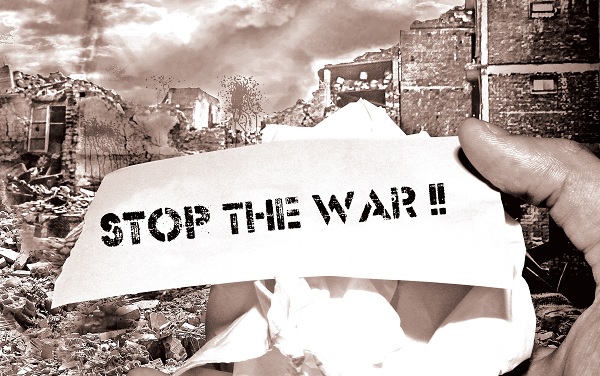
▲Ceasing the war is the way to prevent the number of refugees from continuing to increase.
3. Resettlement of refugees
聯合國難民署2019年2月19日宣佈,2018年估計有120萬難民需要重新安置,而實際只有55,700人得以重新安置,比率只達4.7%。5 結果是許多難民營成為難民長久居留的地方,長期倚靠地主國及國際慈善機構,造成地主國的社會與經濟負擔。
Resettlement promoted by UNHCR involves refugees mainly from several host countries: Lebanon (9,800 people), Turkey (9,000), Jordan (5,100) and Uganda (4,000). According to the official statement of the UNHCR, among the 81,310 applications submitted, the countries with the largest number of refugees are Syria (28,200), Democratic Republic of the Congo (21,800), Eritrea (Eritrea, a country in northeastern Africa with a population of about 5 million, 4,300) and Afghanistan. (4,000). Of the applications submitted in 2018, 68% were survivors of violence and torture, people with legal and physical protection needs, and women and girls at high risk; 52% of the total applications were children.
Resettlement involves moving refugees from their country of asylum to a country willing to accept them and grant them permanent residence. Only a small minority of refugees are so lucky. Typically, less than 1% of the 19.9 million refugees within UNHCR's mandate are resettled. More and more countries are unwilling to accept the influx of refugees. For example, Canada and Australia also accepted refugees in the past, but Australia began to strictly implement immigration policies in 2012 and sent refugees to Australia's Christmas Island in the southeastern Indian Ocean. Australia has been criticized for years for its tough deterrence policy to keep refugees out. 66
Resettlement is a life-saving measure that ensures the protection of people who are at great risk. It is also a practical mechanism for governments and communities to share responsibility for responding to forced displacement crises. Resettlement and other complementary pathways are also a key goal of UNHCR’s promotion of The Global Compact on Refugees, which aims to reduce the impact of large-scale refugee situations on host countries and call on countries to provide more resettlement opportunities. .
In 2019, an estimated 1.4 million refugees living in 65 refugee-hosting countries around the world were in need of resettlement. The main resettlement needs in 2019 came from Syrian refugees stranded in the Middle East and Turkey, as well as refugees from asylum and transit countries along the central Mediterranean coast (Greece, Italy, Spain, etc.). This migration route to Europe is fraught with dangers and continues to claim the lives of migrants and refugees. UNHCR is working with countries and partners to develop a three-year strategy on resettlement and subsidy pathways that will increase resettlement opportunities, encourage more countries to participate in global resettlement efforts, and increase refugee access to other complementary pathways.
The United States used to be the country that accepted the most refugees. Since the bipartisan Congress passed the Refugee Act in 1980, the United States has accepted nearly 3 million refugees. On January 27, 2017, U.S. President Trump signed Executive Order 13769, which took effect immediately, prohibiting citizens of seven Middle Eastern and North African countries, including refugees, from entering the United States. Later, it was changed to eight countries. After being suspended, Executive Order 13780 was signed, excluding Iraq, and then added North Korea and Venezuela. This move by the United States will affect the quota of refugees to the United States. In 2018, the United States accepted only 25,000 refugees, the lowest number in history. 77

▲Political instability, domestic conflicts and wars occur, and those who are most affected are the people living in the local area.
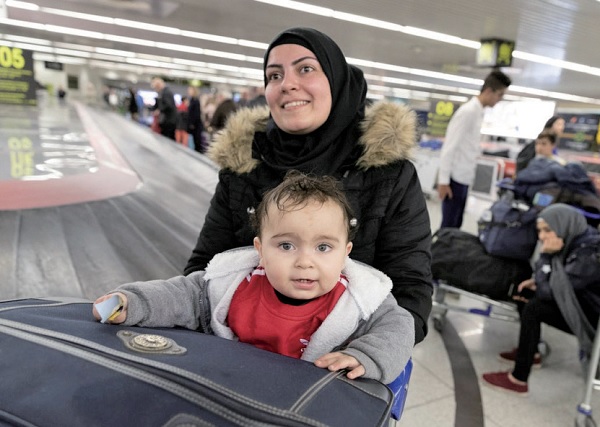
▲After a long wait, a Syrian refugee was finally resettled and arrived in Portugal. How many refugee families are waiting for resettlement in the foreseeable future? (Image source; UNHCR)
4. The impact of assisting refugees on the host country’s economy
Research has found that many refugee-hosting countries try their best to resettle refugees. After they integrate into the local society, they can often make full use of their talents in the new place of residence and make a positive contribution to the economy of the new place of residence, rather than just consuming local resources or taxpayers' money, causing The locals are dissatisfied or the finances cannot bear it. However, as the author mentioned in the previous article, there will still be political and social problems in the short term. How to get along will test the wisdom and efforts of those in power and the local society.
When more than 1 million refugees and immigrants arrived in Europe, it aroused widespread concern that the refugees would have an impact on the host country's economy and finances. The impact of refugees on host countries is controversial and rarely understood. It is widely believed that refugee camps house people who are dependent on aid and welfare. In recent years, many empirical research reports have analyzed that refugees and immigrants have a positive impact on the host country's economy. Due to space limitations, the conclusions of several recent studies are introduced here.
1. 全球發展中心(Center for Global Development)的資深研究員Michael Clemens報導8
In the United States, refugees can become a net contributor to the state coffers eight years after arrival. The assistance they receive upon arrival, measured as a monetary investment, has a positive rate of return a few years later. The study found that refugees' tax returns actually exceeded the benefits they received, adding about $21,000 to their tax returns during their first 20 years in the United States.
Refugees’ contributions also have a multiplier effect: refugees are not just employees, many start their own businesses and become employers, amplifying the positive impact on the economy through job creation. A recent study found that Syrian refugees contributed approximately $334 million to the Turkish economy, with more than 10,000 Syrian-owned businesses employing an average of 9.4 workers.
In situations of large migration flows, job market policy becomes a form of refugee policy. For example, in 2010, only 25% Somali refugees (25-64 years old) were employed in formal economic units in Sweden, while 57% of Somali refugees in the United States benefited from the U.S. right-to-work policy, allowing them to work in formal economic units. employment in the formal economic sector and contribute to the overall economy.
Recent studies have looked at large population movements: from Algeria to France in 1962, from Cuba to Miami in 1980, from the Soviet Union to Israel in the 1990s, and from the Balkans to other parts of Europe in the 1990s. Each refugee event brought Large influxes of new workers, comparable in size to recent inflows into Europe, provide opportunities for comparisons of work conditions among immigrant clusters.
The study found that in two cases, the arrival of immigrants had either no impact or a positive impact on the local job market: The arrival of 125,000 Cubans in Miami had no impact on the unemployment rate and was followed by a slight increase in average low-skill wages. The entry of Soviet refugees into Israel was enough, in just four years, to increase the country's population by 12% and significantly increase wages in the occupations in which they worked.
Looking at the current crisis, the impact on the job market in Germany appears to have been minimal so far. Almost all refugees receive substantial amounts of public assistance upon arrival and many years after their stay, and countries vary in how they require refugees to repay the assistance later. But by far the most important determinant of the net fiscal effect is how quickly refugees integrate into the job market and start generating tax revenue.
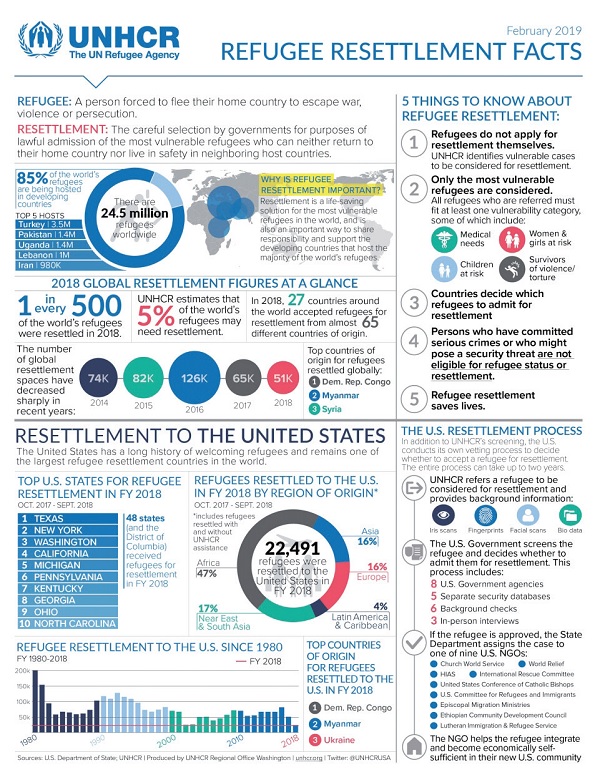
▲Refugee truth document compiled by the United Nations Refugee Agency. (Source: United Nations Refugee Agency)
2. 新美國經濟研究基金會(New American Economy Research Fund)在2017年的《新美國經濟報告─從鬥爭到復原力:美國難民的經濟影響》9
Refugees had a combined household income of more than $77 billion in 2015 and paid nearly $21 billion in taxes. The report provides a comprehensive analysis of the contribution of refugees to the U.S. economy and an analysis of the often misunderstood economic contribution of the foreign-born population. This report shows: (1) Refugees have even higher entrepreneurship rates than other immigrants; (2) Refugees make meaningful contributions to the U.S. economy as money-makers and taxpayers; (3) Although refugees will receive initial assistance upon arrival in the United States, But incomes increased rapidly in subsequent years; and (4) refugees made particularly meaningful contributions to the economies of several key states. In 18 U.S. states—including Minnesota, Michigan and Georgia—refugees in the study sample had more than $1 billion in spending power. In California alone, their spending power exceeds $17 billion. In Texas, it exceeds $4.6 billion; (5) This is especially true for refugees taking root and building lives in the United States compared with other immigrants. For example, among all refugee families, more than 57% families own their own homes, a rate relatively close to the overall homeownership rate among U.S. residents; (6) In an era when the country is facing unprecedented demographic challenges, refugees are in a unique position to assist. Recent estimates suggest that the U.S. population aged 65 and older will rise from 12.41T in 2000 to 20.31T in 2030. Refugees can help relieve the stress of anticipated employment and welfare programs.
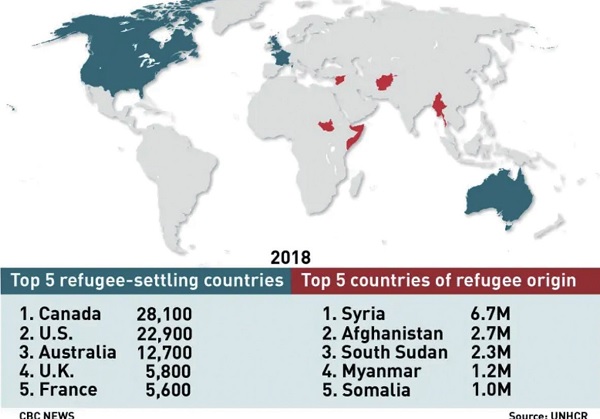
▲Comparison chart of the top five refugee-hosting countries and the top five refugee-source countries according to statistics from the United Nations Refugee Agency. (Source: UNHCR)
3. 國民移民論壇(National Immigration Forum)在2018年6月發表的研究報告10
Immigrants are economic contributors and a fiscal success story. Refugees contribute billions of dollars to the economy each year through consumer spending and entrepreneurship, creating a net positive fiscal impact. Additionally, refugees help revitalize declining areas and promote the creation of vibrant communities. Refugees are vital to the U.S. job market by filling needed jobs, and as a group, refugees have higher employment rates than the U.S.-born population. Between 2009 and 2011, the employment rate for working-age refugee men was 67%, while during the same period the employment rate for native-born men was only 60%.
A study of refugees who arrived in the United States in 1980 found that a decade later, refugees earned $20% more than economic immigrants during the same period. Refugees also gradually outperformed other economic immigrants by increasing their working hours by 4% and their English literacy skills by 11%.
4. 利益或負擔(Bounty or burden?)11
What is the net macroeconomic impact of refugees? This question is usually not the first consideration for the average person. Instead, most people were more focused on how refugees affected their daily lives or whether they had to compete with refugees for jobs. Such concerns go some way to explaining the rise in support for far-right parties in some countries, such as the Sweden Democrats or the Alternative for Germany. In Germany, refugee-related expenditures last year exceeded 20 billion euros in absolute terms.
Research shows that a displacement effect may exist (e.g. Germany’s refugee-related expenditures exceeded 20 billion euros in 2018, causing concern). Domestic workers with similar skills as new residents may suffer, but other types of workers would benefit. In the short term, there may be a negative impact on the domestic economy, as all refugees arriving in European Union countries will need to be housed and fed. Their medical needs must be met, and both children and adults need education to prepare them for entry into the local workforce. Financial support is also necessary until they are equipped. But the ensuing stimulus from government spending and fiscal transfer payments will give domestic demand a shot in the arm.
According to estimates by the International Monetary Fund, by the end of 2017, the GDP of Austria, Germany and Sweden, the three countries with large refugee populations, will have increased by 0.5%, 0.3% and 0.4% respectively.
While the successful integration of refugees poses a challenge for policymakers, it may pay dividends in the long run. Europe is aging rapidly, and the old-age dependency ratio in the EU-28 is expected to soar from 28.8% in 2015 to 50.3% by mid-century. Europe’s pension and healthcare systems are already crumbling under the pressure of having to provide for large numbers of retirees. The recent influx of refugees arriving in Europe could alleviate some of this burden. Most refugees are young: about 50% of those seeking asylum in the EU over the past few years were between 18 and 34 years old, while nearly a third were under 18. They may also have higher fertility rates than native-born citizens.
5. How Christians can participate in the ministry of assisting refugees
The Bible’s Attitude toward Refugees and Immigrants
God is a merciful and loving God, and He wants His people to show care for the disadvantaged, especially by preaching the gospel to them—most of whom are Muslim believers. The Lord Jesus gave us a good example of taking in refugees. “When He saw the crowds, He had compassion on them, because they were wretched and homeless, like sheep without a shepherd.” But He then encouraged his disciples to take action, “The harvest is plentiful. , there are few workers. Therefore, ask the Lord of the harvest to send out workers into his harvest.” (See Matthew 9:36-38)
In the Old Testament, it is also mentioned that God takes care of orphans, widows and strangers (such as Leviticus 19:33-34; Deuteronomy 10:18-19), and also says: "You shall not oppress the stranger" (see Exodus 23:9), with empathy, because the Israelites were strangers in Egypt and knew the heart of the strangers; and if they did not take care of the strangers, they would not please God (see Malachi 3:5, Jeremiah Micah 7:5, Isaiah 58:6-7). In addition, when harvesting crops or harvesting fruits in vineyards, do not harvest them all or glean what is left behind. Leave some for the poor or strangers, and you will be blessed (see Leviticus 19:9-10).
Assistance to refugees
There are nearly 70 million displaced people around the world, 25 million of whom are refugees, who were forced to flee their homes due to war, persecution or famine. Half of them are underage children.
In addition to the United Nations High Commissioner for Refugees and various agencies dealing with refugee issues, many international charities also invite all parties to donate for relief. The Christian charity system includes the Refugee Children's Crisis Fund (donate.worldvision.org/give/refugee-childrens-crisis-fund) established by World Vision, the Refugee Relief Fund of the Reformed Church in the United States ( Refugee Crisis Fund (rca.org/refugee-crisis-fund), Church World Service (cwsglobal.org/get-involved/welcome-a-refugee), a multi-denominational U.S.-based church world service, and World Relief (worldrelief.org/volunteer) etc. Other participating charities are Jusoor (jusoorsyria.com, assisting development in Syria), Save the Children (savethechildren.org), International Rescue Committee (rescue.org), Karam Foundation (karamfoundation.org), Médecins Sans Frontières (msf.org )wait. 1212
筆者在上篇提到德國總理梅克爾獨排眾議接受難民,主要是她有堅定的基督教信仰及悲天憫人的胸懷。她屬於柏林路德宗福音教會,在談到信仰時曾說:「我是福音派教會的成員。我相信上帝,宗教也是我永遠的伴侶,一直是我一生的伴侶。基督徒首先不應該害怕捍衛我們的信仰。」她也公開宣佈德國並非遭受「太多伊斯蘭教」,而是「太少基督教」。13 梅克爾的基督教信仰帶來的道德勇氣值得我們欽佩。遺憾的是大多數人只顧眼前的利益受損,而不願對苦難的難民伸出援手。
難民危機發生後,也有各國的宣教士進到難民營去服事,其中有不少是華人宣教士。例如有來自香港、臺灣及中國大陸的華人宣教士進入土耳其服事來自敘利亞的難民;14 進入瑞典服事來自中東的難民;15 在美國本地參與協助難民事工;16 也有到敘利亞的難民營從事關懷與宣教的宣教士;17 以及在德國或其他國家的宣教關懷事工。18
The Catholic Pope also issued a proclamation on World Refugee Day in 2018 calling on Christians across the world to pay attention to the refugee issue, and quoted the words of Jesus: "I was a guest, and you welcomed me." (Refer to Matthew 25:35) Reminding believers to accept Immigration and refugees are "direct implementation actions". “When people knock on our doors, seeking safety and a better future, we are hosting the Lord, and that is something pure and basic,” he said. 1919
What can Christians do for refugees?
全球難民規模龐大,很多人覺得自己對協助難民危機無能為力。但事實並非如此,我們每天都可以做很多事情來協助難民。最主要是對難民的處境有憐憫及同理心;其次為難民事工及在難民區工作的宣教士禱告。如果不能親身參與,也至少可奉獻金錢支持難民事工,包括捐款給在難民區工作的宣教士、難民事工機構,或聯合國難民署。20 作義工、更深入認識難民議題、參加請願、捐款等工作,可以幫助受難民危機影響的人,或在本地參與關懷難民的事工及協助難民安頓。
If you can afford it, you can consider participating in short-term missions to refugee camps and assisting in purchasing or selling handicrafts produced by refugees. If possible, try to reach the unbelievers with the gospel. We also encourage leaders of Chinese churches everywhere to have the responsibility to lead church members to join in the ministry of supporting refugees and spread the gospel into refugee camps and places where refugees are resettled.
Currently, our colleagues are cooperating with an online teaching organization to teach refugee children English and other practical technical courses through the Internet. Readers can also participate if they are interested. twenty one21
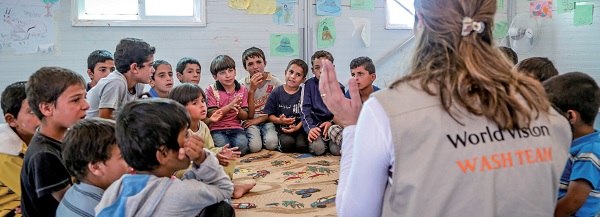
▲There are many ways that Christians can help refugees everywhere. The picture shows World Vision volunteers teaching children in a refugee camp. (Image source: World Vision website)
1. Refer to He Qinglian’s column: Refugee Issue - The World’s Unsolvable Knot www.upmedia.mg/news_info.php?SerialNo=47408
2. 68% (13.45 million) came from five countries: Syria (6.29 million), Afghanistan (2.62 million), South Sudan (2.44 million), Myanmar (1.11 million), and Somalia (0.99 million). According to statistics from the United Nations Refugee Agency.
3. Central American migrants face grueling journey north, res.dallasnews.com/interactives/migrantroute/
4. www.worldbank.org/en/news/press-release/2018/09/19/decline-of-global-extreme-poverty-continues-but-has-slowed-world-bank; www.worldbank.org/ en/topic/poverty/overview;
5. news.un.org/zh/story/2019/02/1028781; news.un.org/en/story/2019/02/1033061
6. en.wikipedia.org/wiki/Christmas_Island_Detention_Centre
7. www.globalcitizen.org/en/content/us-accepted-refugees-2018/. www.refugeesinternational.org/reports/2018/6/19/report-card-on-the-trump-administrations-performance-on-refugee-and-humanitarian-protection. In fiscal year terms, October 2017 to September 2018, the number is 22,491, see www.unhcr.org/resettlement-in-the-united-states.html, 2/2019. Figures may vary according to different reports.
8. The Real Economic Cost of Accepting Refugees 9/14/2017 Michael Clemens, www.cgdev.org/blog/real-economic-cost-accepting-refugees
9. From Struggle to Resilience: The Economic Impact of Refugees in America. 6/19/2017, research.newamericaneconomy.org/report/from-struggle-to-resilience-the-economic-impact-of-refugees-in-america. /
10. Immigrants as Economic Contributors: Refugees Are a Fiscal Success Story for America 6/14/2018, immigrationforum.org/article/immigrants-as-economic-contributors-refugees-are-a-fiscal-success-story-for-america /
11. The impact of refugees on European economies is far from clear. Focus Economics, www.focus-economics.com/blog/impact-of-refugees-on-european-economies
12. Reformed Refugee Relief Fund of America (www.rca.org/mission/refugees). For other aid agencies, see stepfeed.com/6-international-charities-that-are-helping-refugees-5250.
13. Angela Merkel: How Germany's Iron Chancellor is shaped by her Christianity, www.christiantoday.com/article/angela-merkel-how-germanys-iron-chancellor-is-shaped-by-her-christianity/75803.htm; later Sentence quoted from en.wikipedia.org/wiki/Angela_Merkel.
14. cdn-news.org/news/14739
15. chinese.gospelherald.com/articles/26963/20180712/ Missionary daughters serve refugees - helping the second generation of immigrants integrate into Sweden with love.htm. In recent years, a wave of refugees from the Middle East has erupted, with many Afghans, Iraqis and Syrians pouring into Sweden. In 2015, Sweden, with a population of 9.8 million, received more than 160,000 refugees from the Middle East and North Africa, becoming a European force. In Sweden, which attaches great importance to human rights and social welfare, the government also provides refugees with housing, monthly subsidies, employment subsidies, children's education and medical benefits.
16. behold.oc.org/?p=28526 (Middle East Refugee Ministry - Compassion for the poor and homeless, Swinger).
17. shen-guo.org/missionaries-vanished.html ("Missionaries Vanished on the Horizon", Five Grains of Rice, "Kingdom of God" magazine, Issue 54). www.ct.org.tw/1336349〈What is happening in the refugee camps in the Middle East? 〉, Huang Mingfa).
18. www.globalmissiology.org/chinese/f15/evangelism03_200901.htm (Review and Prospect of Evangelical Mission in Germany, Pastor Hong Limin - Missionary of China Evangelical Mission in Germany).
19. www.vaticannews.va/zht/vatican-city/news/2019-03/world-day-migrants-refugees-theme-czerny-vatican.html
20. In addition to the organizations listed in Note 11, readers can check online for more organizations that support refugees. Donate to UNHCR: US, give.unrefugees.org; International, donate.unhcr.org; Hong Kong, donate.unhcr.org/hk/.
21. See Gao Lili, "Those Unforgettable Figures, Mood Notes on a Journey to the Middle East", "The Kingdom of God" magazine, Issue 56, Summer 2019, shen-guo.org/unforgettable-figures.html.
 Wen Yingqian, Honorary Professor of Donghua University in Taiwan, Chairman of the Board of Directors of Kingdom of God Resources and Editor-in-Chief of the Talent Unit of Kingdom of God Magazine.
Wen Yingqian, Honorary Professor of Donghua University in Taiwan, Chairman of the Board of Directors of Kingdom of God Resources and Editor-in-Chief of the Talent Unit of Kingdom of God Magazine.
